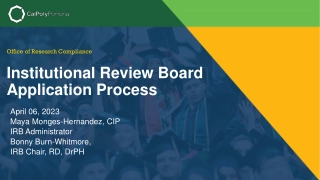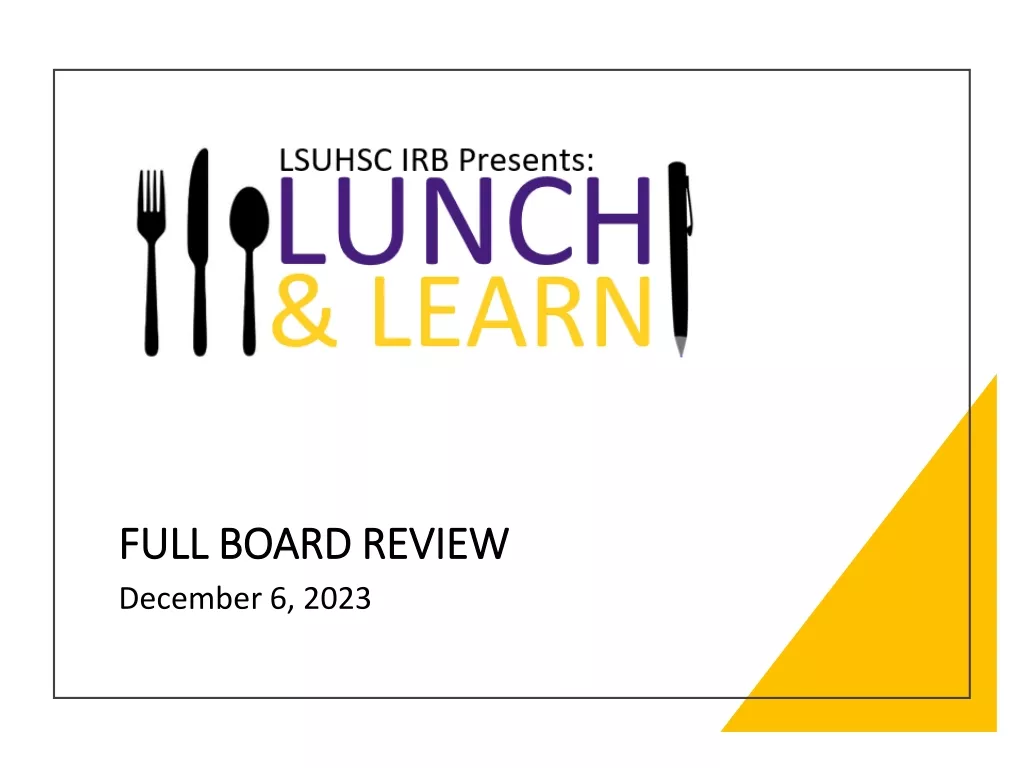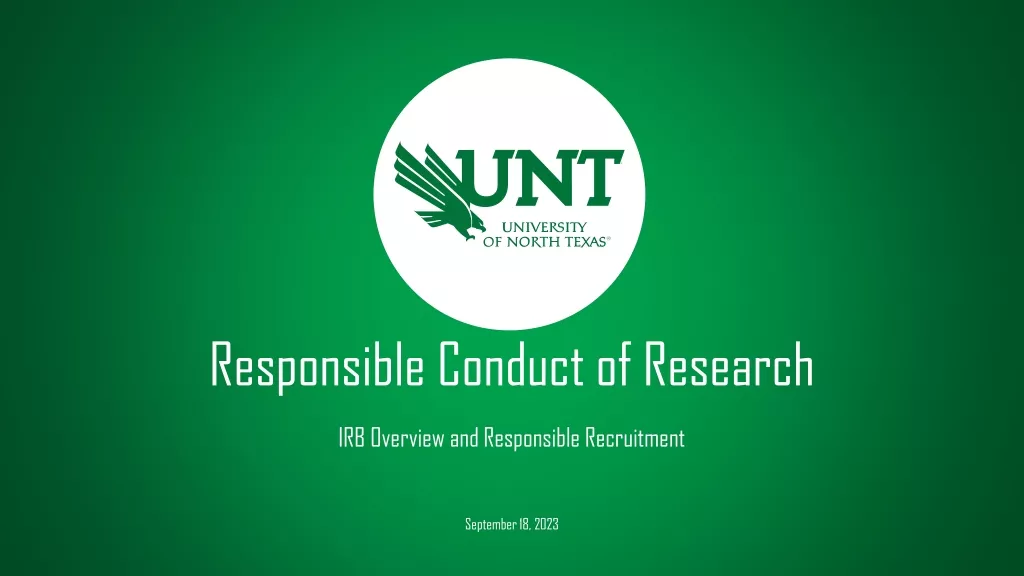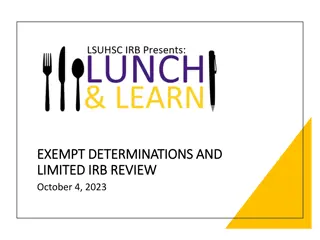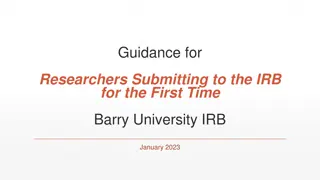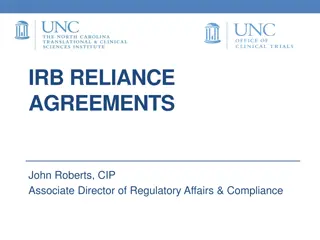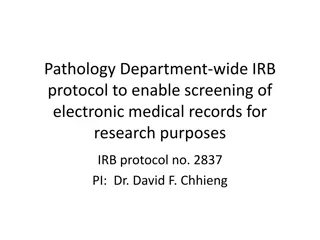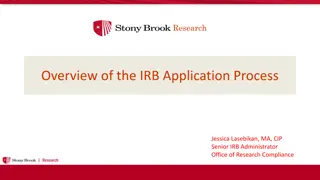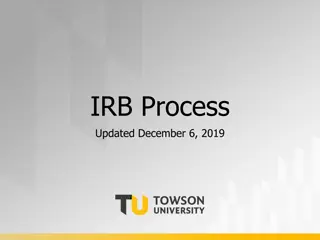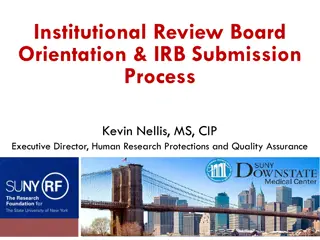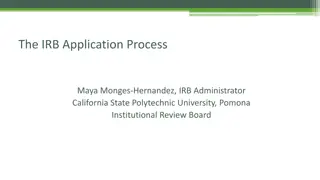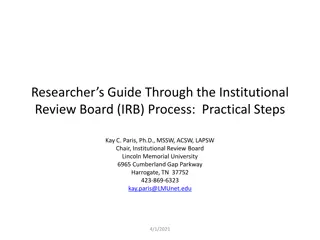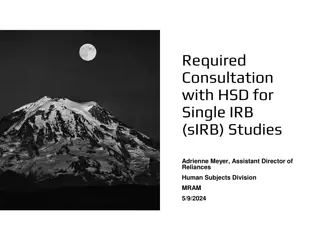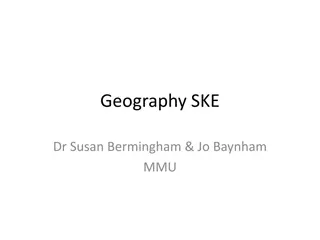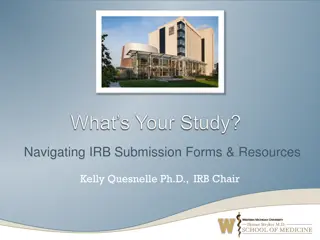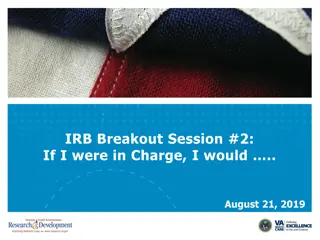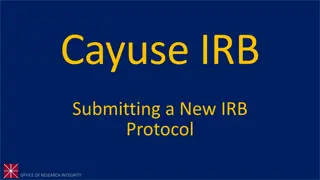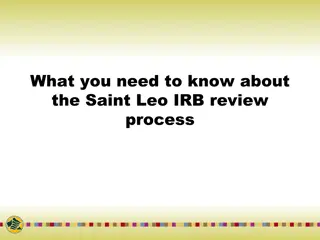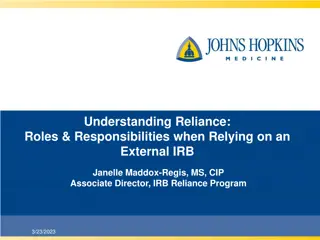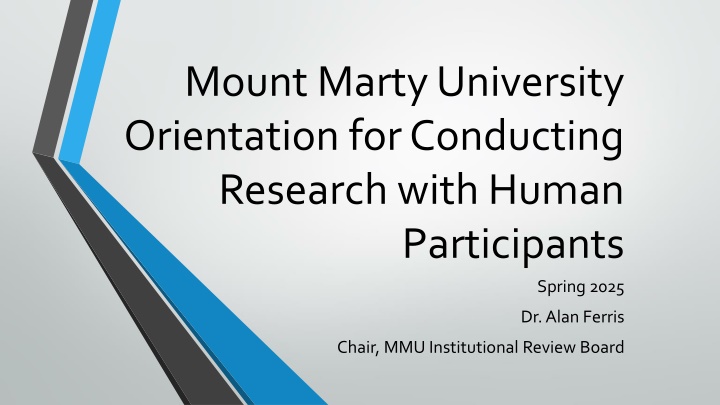
Ethical Guidelines for Research with Human Participants
Understand the importance of guidelines for research with human participants, tracing the historical context, from the need for ethical principles to the Belmont Report and modern regulations. Learn about the key principles of respect, beneficence, non-maleficence, and justice guiding research practices. Explore the oversight mechanisms at Mount Marty University to ensure compliance with federal guidelines like informed consent, risk assessment, and subject selection.
Download Presentation

Please find below an Image/Link to download the presentation.
The content on the website is provided AS IS for your information and personal use only. It may not be sold, licensed, or shared on other websites without obtaining consent from the author. If you encounter any issues during the download, it is possible that the publisher has removed the file from their server.
You are allowed to download the files provided on this website for personal or commercial use, subject to the condition that they are used lawfully. All files are the property of their respective owners.
The content on the website is provided AS IS for your information and personal use only. It may not be sold, licensed, or shared on other websites without obtaining consent from the author.
E N D
Presentation Transcript
Mount Marty University Orientation for Conducting Research with Human Participants Spring 2025 Dr. Alan Ferris Chair, MMU Institutional Review Board
Why do we need guidelines for research with human participants? CIA and the Cold War (1950 s-1960 s) Radiation Experiments Cincinnati Project How much radiation before unable to function Vanderbilt Study Maximum exposure to pregnant women Oregon State Effect of radiation on sperm production in prisoners Military Experiments drop chemicals on communities Zimbardo Study Prison Violence (early 1970 s) Milgram Study Electric Shock on Learning (early 1970 s)
Public Outcry from research July 12, 1974 National Research Act passed Created the National Commission for the Protection of Human Subjects of Biomedical and Behavioral Research Two Charges Identify the basic ethical principles that underlie Biomedical and Behavioral Research Develop guideless that assure all ethical principles are followed 11 Member commission created the Belmont Report in 1979
Guidelines for the Ethical Treatment of Human Participants Belmont Report (1979) Respect for persons -treat each participant as a person Beneficence protect participants, secure their well being Do no Harm Maximize benefits and minimize harm to each participant Justice sense of fairness in distribution of risks and benefits
Modern Guidelines for the Ethical Treatment of Human Participants The Code of Federal Regulations for Research is monitored by the U.S. Department of Health and Human Services Informed Consent Do participants know what they are getting into? Assessment of Risk and Benefits Do the benefits of the study outweigh the risks to the participants? Selection of Subjects How are participants selected, are any at risk populations involved?
Mount Marty University Oversight to Ensure Compliance with Federal Guidelines Institutional Review Board (IRB) Purpose Ensure there is informed consent for participants. Evaluate the risks and benefits of the study. Ensure that participants are not coerced into participation.
MMU Institutional Review Board (IRB) Membership No fewer than 5 members with the following criteria One member from a scientific area. One member from a non-scientific area. One member not affiliated with the University. Currently have 6 members (Paul Anders [non-science area], Lindsay Barthal, Kathy Magorian, Alan Ferris, Chun Wu, Tom Stanage [not affiliated with MMU], Kristy Welker Coordinator Appointed to 3-year terms by the President of the University Can be appointed to an unlimited number of terms
What the MMU IRB Committee Reviews Risk to participants Is there minimal risk or more than more than minimal risk? Selection of participants Is it voluntary, are they selected fairly? Informed consent Do participants know what they are getting involved with and do they know they can quit at any time?
Procedures to Ensure Compliance with Federal Guidelines All faculty research, and research completed for master s or doctorate degree must be known to the IRB. Not all research requires IRB approval.
Three Levels of IRB Involvement (Overview) Exempt from IRB Review, only need to notify IRB of research Minimal risk and meets one of the five criteria for exempt research (next 4 slides) Expedited IRB Review (one committee member reviews) Minimal risk, does not meet any of the exempt categories, does meet one of the seven criteria for expedited review (in 5 slides) Full IRB Review (full committee reviews) More than minimal risk or involves a vulnerable population (in 11 slides)
Exempt from IRB Review (1 of 4) 1. Research conducted in established or commonly accepted educational settings, involving normal educational practices. Such as research on regular and special education instructional strategies, or research on the effectiveness or the comparison among instructional techniques, curricula, or classroom management methods.
Exempt from IRB Review (2 of 4) 2. Research involving the use of educational tests, survey procedures, interview procedures or observation of public behavior and the data is such that if it is publically released it will not place the participants at risk of criminal or civil liability or damage their employment or reputations. Almost all testing, survey and observational research fall into this category.
Exempt from IRB Review (3 of 4) 3. Research involving collection or study of existing data, documents, records, or pathological or diagnostic specimens. 4. Research studying, evaluating, or examining the public benefit of service programs if the study has been approved by the department or agency head.
Exempt from IRB Review (4 of 4) 5. Research involving taste and food quality evaluation or consumer acceptance studies, and the study involves the evaluation of taste or food quality, and the food has ingredients, chemicals, and contaminants below the level defined as safe by the Food and Drug Administration or approved by the Environmental Protection Agency or the Food Safety and Inspection Service of the U.D. Department of Agriculture.
Expedited Review (1 of 6) (only one committee member reviews the proposal) Must have Minimal Risk and fit into one of 7 categories. 1. Clinical Studies A) New applications for existing drugs. Research on the marketing of drugs that may significantly increase the risks or decrease the acceptability of a drug is not eligible for expedited review. B) Medical Devices if they have been approved for marketing and is being used in accordance with its approved labeling.
Expedited Review (2 of 6) 2. Collection of blood samples by finger stick, heel stick, ear stick or venipuncture from a) healthy, nonpregnant adults who weigh at least 110 pounds, not to exceed 550 ml in an 8-week period, or b) from other adults and children, considering the age, weight and health of the participants, the collection procedures, and amount of blood collected (may not exceed 3 ml per kg in an 8-week period)
Expedited Review (3 of 6) 3. Prospective collection of biological specimens for research purposes by noninvasive means. Examples: (a) Hair and nail clippings; (b) Deciduous teeth at time of exfoliation or if routine patient care indicates a need for extraction; (c) permanent teeth if routine patient care indicates a need for extraction; d) Excreta and external secretions (including sweat); e) Uncannulated saliva; f) Placenta removal at delivery; g) Amniotic fluid obtained at the time of rupture of the membrane prior to or during labor; h) Supra-and subgingival dental plaque and calculus provided collection is not more invasive than routine scaling of teeth; i) Mucosal and skin cells collected by buccal scraping or swab, skin swab, or mouth washing; j) Sputum collected after saline mist nebulization
Expedited Review (4 of 6) 4. Collection of data through noninvasive procedures (not involving general anesthesia or sedation) routinely employed in clinical practice, excluding procedures involving x-rays or microwaves. When medical devices are employed, they must be cleared/approved for marketing.
Expedited Review (5 of 6) 5. Research involving materials (data, documents, records or specimens) that have been collected or will be collected solely for non-research purposes (such as medical treatment or diagnosis). 6. Collection of data from voice, video, digital, or image recordings made for research purposes.
Expedited Review (6 of 6) 7. Research on individual or group characteristics or behavior (including, but not limited to, research on perception, cognition, motivation, identity, language communication, cultural beliefs or practices, social behavior), or research employing survey, interview, oral history, focus group, program evaluation, human factors evaluation, or quality assurance methodologies.
Research Needing Full IRB Review Either Condition Exists Research Involving Vulnerable Populations All research with prisoners Certain research with pregnant women Certain research with those who can not give legal consent to participate children, intellectually disabled, elderly Research Involving More than Minimal Risk to Participants
Other Situations That Need IRB Attention Amended Review there are changes to a study any time after it has been reported to or approved by the IRB and the study is concluded. Continuing Review annual approval is needed if the study is over one year long. Reporting Unanticipated Problems adverse experiences by participants need to be reported to the IRB.
So what level of IRB involvement will my study need? Exempt If the study meets any ONE of five categories, researchers only need to notify the IRB committee of the study. Be sure to evaluate your study in each of the five categories. Expedited does not meet an exempt category but does meet ONE of the seven expedited categories. Full Review does not meet exempt or expedited categories or has more than minimal risk or involves at risk populations.
Flowchart to help you determine what level of IRB involvement is required 1. Is the activity research? (Systematic investigation designed to develop and contribute to generalizable knowledge)[Federal Definition] Yes go to question 2 No - Does not meet federal definition of research, NO IRB notification or approval required. Most undergraduate class projects fall into this category. The projects are done to learn research skills, but there is no intention to have the projects presented at a regional or national conference or be published in a scientific journal.
Flowchart to help you determine what level of IRB involvement is required 2. You obtain information about living individuals? Yes go to question 3 No This research does not involve human subjects, no IRB notification or approval is required.
Flowchart continues 3. Does the research involve intervention or interactions with individuals? Yes Go to Question 4 No Is the information individually identifiable? Yes Is the information private? Yes Go to question 4 No IRB notification is required, No IRB approval is required No IRB notification is required, No IRB approval is required
Flowchart continues 4. Does it involve prisoners, pregnant women, handicapped or mentally disabled persons, economically or educationally disadvantages persons and other populations subject to coercion? Yes Full IRB Approval required No Go to question 5
Flowchart continues 5. Does the research fit into any of the five exempt categories? Yes IRB Notification is required, no IRB Approval needed) No IRB Approval is required 6. Does the research fit into any of the seven expedited categories? Yes Expedited IRB review is required No Full IRB review is required
What the IRB committee will not do Look at the quality of your research question, methodology or instruments used to collect data.
What the IRB committee will do The committee may suggest your study needs a different level of approval than what was requested. The IRB is only concerned about the protection of the human participants in your study.
What is the IRB options with a proposal Approve as submitted Approve with modifications Ask for more information before a decision is make Deny and ask for a resubmission with major changes Deny as a final action
How long does it take to get IRB Approval Under most circumstances submissions are reviewed within a week. If no response from the committee in two weeks follow up with Kristy
What you need to do before you submit your proposal to the IRB You must complete IRB Training Mount Marty participants in CITI training for research for human subjects. You must complete CITI training before you submit your IRB proposal.
MMU CITI Training Process To find this Begin at the Mount Marty Web-page, then select the following About Us Academic Excellence Institutional Effectiveness Institutional Review Board (on left side of page) Scroll down and you will find a place to Open the link to CITI Training to register Follow the directions on the screen
Where to find MMU Forms and Procedures Begin at the Mount Marty Web-page, then select the following About Us Academic Excellence Institutional Effectiveness Institutional Review Board (on left side of page) Scroll down and you will find all of the policies and forms to download and complete Submissions are sent to Kristy Welker at Kristen.welker@mountmarty.edu
Questions? Direct IRB questions to Alan Ferris at aferris@mountmarty.edu Direct Submission question to Kristy Welker at kristywelker@mountmarty.edu Submissions can also be mailed to Kristy Welker at IRB/Kristy Welker Mount Marty University 1105 West 8thStreet Yankton, SD 57078


